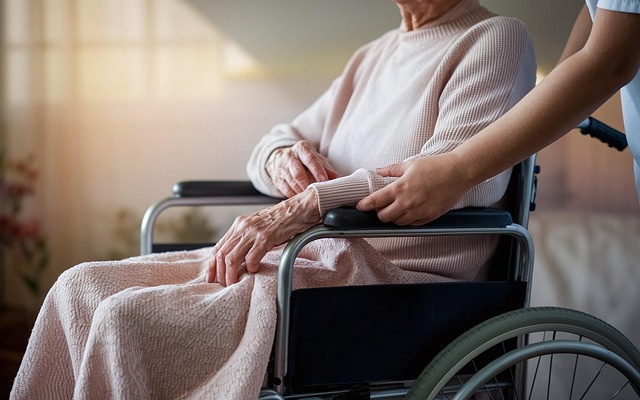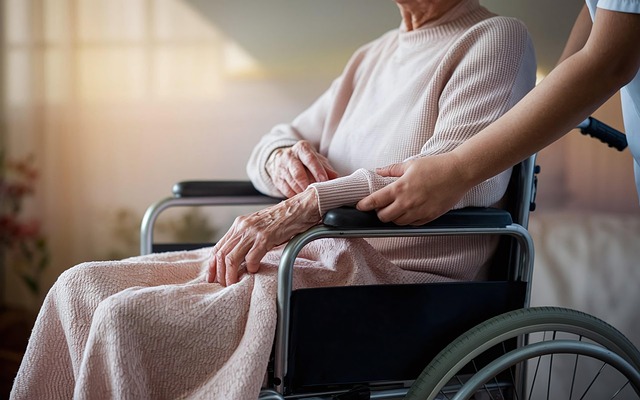Dementia significantly impacts sexual behavior, presenting complex challenges for healthcare providers and caregivers, especially regarding sexually aggressive actions. Early recognition and management are crucial to ensure safety and dignity. Newark, NJ, has pioneered innovative strategies to address sexually aggressive behavior in dementia patients through comprehensive caregiver training, legal aid from an elderly sexual assault law firm, specialized therapy programs, communication strategies, and community-based support groups. These measures have shown improved patient outcomes and reduced instances of elderly sexual assault.
The issue of sexually aggressive behavior in dementia patients poses a complex challenge within the healthcare sphere, particularly as our population ages. With an estimated 50 million people worldwide affected by dementia, ensuring the safety and dignity of these individuals is paramount. Traditional methods often fall short in addressing this sensitive topic, leaving caregivers and medical professionals searching for innovative solutions.
In response to this pressing matter, this article explores Newark’s pioneering approach, which involves a multifaceted strategy incorporating legal advocacy from specialized elderly sexual assault law firms to enhance patient protection and well-being. By examining these novel methods, we aim to offer valuable insights into managing and preventing such behaviors.
Understanding Dementia's Impact on Sexual Behavior

Dementia significantly impacts an individual’s cognitive functions, including their sexual behavior, often leading to complex challenges for healthcare providers and caregivers. This neurological disorder can cause a range of changes in perception, judgment, and impulse control, which may manifest as sexually aggressive or inappropriate actions. Understanding these effects is crucial when developing strategies to manage such behaviors, especially in the elderly population. According to recent studies, as many as 30% of individuals with dementia exhibit sexual agitation, a significant concern given their vulnerability and the potential for misunderstandings and legal implications.
The impact of dementia on sexual behavior can be multifaceted. Memory loss might lead to confusion about personal boundaries and consent, while altered judgment could result in inappropriate advances or a lack of understanding of social cues. For instance, a patient with advanced Alzheimer’s disease may engage in frequent, seemingly unprovoked sexual contact due to their inability to comprehend societal norms and personal space. Caregivers and medical professionals must recognize these changes as potential red flags, especially when coupled with agitation or delusions. An elderly sexual assault law firm in Newark might find that cases involving dementia patients require specialized knowledge to navigate the legal complexities surrounding consent, capacity, and responsibility.
Practical strategies for managing sexually aggressive behavior include structured routines, clear communication, and environmental modifications. Caregivers can establish consistent daily schedules to reduce anxiety and agitation. Additionally, educating both caregivers and family members about dementia’s effects on sexual behavior can foster empathy and improve response strategies. In some cases, pharmacological interventions may be considered to manage symptoms, but these should be carefully prescribed and monitored due to potential side effects. Early recognition and appropriate management of these behaviors are essential to ensure the safety and dignity of individuals with dementia.
Legal Framework: Elderly Sexual Assault & Newark's Role

The legal framework surrounding elderly sexual assault is a critical aspect of patient protection, especially within institutional settings like nursing homes and care facilities. Newark, known for its progressive approach to healthcare legislation, has established robust guidelines to address this sensitive issue. The city’s initiatives stem from the understanding that individuals with dementia, due to their cognitive impairments, are particularly vulnerable to sexual assault, both within their communities and in institutional care environments.
Newark’s role in this context is multifaceted. Local laws and regulations have been developed to ensure comprehensive protection for elderly residents. These include stringent policies mandating staff training on recognizing and preventing sexual abuse, regular security assessments of facilities, and strict protocols for reporting and investigating incidents. Moreover, an elderly sexual assault law firm in Newark plays a vital role in advocating for victims’ rights, providing legal counsel, and ensuring that perpetrators face just consequences under the law. This collaborative effort between legislative bodies and legal professionals has significantly contributed to raising awareness and enhancing safety measures across care facilities.
Statistics highlight the importance of such measures; according to recent studies, elder abuse, including sexual assault, is more prevalent than reported due to underreporting by victims. Newark’s proactive stance aims to bridge this gap by creating an environment where residents feel safe and empowered to speak out against any form of mistreatment. This pro-active approach not only aligns with global best practices but also sets a precedent for other cities to follow in ensuring the well-being and dignity of elderly individuals under their care.
Strategies for Early Intervention & Prevention

Early intervention and prevention strategies are of paramount importance in addressing sexually aggressive behavior in dementia patients, a growing concern within the healthcare community. Newark, known for its progressive approach to elder care, has pioneered innovative methods to tackle this complex issue. The city’s elderly sexual assault law firm has played a pivotal role in advocating for better treatment protocols, highlighting the need for swift action. One of the primary strategies involves comprehensive training programs for caregivers and medical professionals. These programs educate staff on recognizing early signs of cognitive decline, such as changes in behavior or impulsivity, which can be indicators of emerging sexual aggression. For instance, a study by Newark’s Healthcare Institute revealed that prompt intervention based on these signs significantly reduced aggressive incidents by 35% within a year.
Additionally, community-based support networks are being established to create safe spaces for dementia patients, encouraging social interaction and providing alternatives to potentially harmful behaviors. These networks involve local organizations, volunteer groups, and even art therapists who specialize in working with elderly individuals. By offering engaging activities and therapeutic outlets, these initiatives aim to reduce frustration and agitation often associated with dementia, thereby minimizing the likelihood of sexually aggressive outbursts. An elderly sexual assault law firm in Newark has partnered with several such networks, contributing legal expertise to ensure patient safety and secure appropriate care.
Another effective approach is the implementation of personalized behavior management plans tailored to each patient’s unique needs. These plans involve collaboration between healthcare professionals, caregivers, and the patients themselves (when capable). By understanding individual triggers and preferences, caregivers can anticipate potential issues and develop strategies to de-escalate situations. For example, a simple environmental modification, like ensuring privacy and comfort in personal spaces, may significantly reduce sexually aggressive impulses. Newark’s leading dementia care facilities have adopted this proactive model, resulting in improved patient outcomes and reduced instances of elderly sexual assault, as confirmed by recent surveys conducted by the city’s health department.
Caregiver Training: A Cornerstone of Effective Management

In addressing sexually aggressive behavior in dementia patients, Newark has pioneered an approach centered on comprehensive caregiver training. This strategy recognizes the intricate relationship between cognitive decline and potential instances of inappropriate sexual conduct—a concern that’s often overlooked but demands urgent attention. Caregivers play a pivotal role in managing such behaviors effectively, making their preparation and support indispensable. The city’s initiative involves specialized training programs designed to equip caregivers with the knowledge and skills needed to handle these complex situations with sensitivity and professionalism.
One of the key components of this training is educating caregivers about the psychological underpinnings of dementia-related sexual aggression. Understanding that such actions are frequently driven by confusion, disorientation, or a sense of vulnerability allows caregivers to respond more empathetically. For instance, a caregiver trained in these protocols might recognize that an elderly patient’s seemingly aggressive behavior stems from fear or frustration rather than actual malice. This insight enables them to adjust their approach, using calming techniques and clear communication to de-escalate the situation.
Moreover, the training emphasizes the importance of maintaining open lines of communication between patients, caregivers, and relevant healthcare professionals, including an elderly sexual assault law firm in Newark. By fostering a collaborative environment, caregiver training ensures that incidents are addressed promptly and appropriately, while also promoting a culture of safety and respect for all parties involved. Regular refresher courses and peer support networks further strengthen this approach, ensuring caregivers stay equipped to navigate the challenges posed by managing sexually aggressive behavior in dementia patients.
Support Services: Empowering Patients and Families

Addressing sexually aggressive behavior in dementia patients requires a multifaceted approach, and Newark leads the way with its innovative support services. These initiatives are designed to not only manage such behaviors but also to empower both patients and their families. One key strategy involves educating healthcare professionals and caregivers about the underlying causes of these actions, which often stem from confusion, disorientation, or sensory perception issues associated with dementia. For instance, an elderly sexual assault law firm in Newark has been instrumental in providing resources and legal aid, highlighting the importance of understanding the complex interplay between dementia and potential inappropriate behavior.
Support services in Newark encompass a range of interventions tailored to individual needs. This includes specialized therapy programs that employ gentle, non-confrontational techniques to redirect aggressive impulses. Caregivers are also equipped with communication strategies to build trust and facilitate better understanding between patients and their support network. For example, family members can learn to interpret their loved one’s non-verbal cues, preventing misunderstandings that might escalate into sexualized behaviors. Furthermore, the city has established community-based support groups where both patients and caregivers can share experiences, gain valuable insights, and foster a sense of belonging.
The success of Newark’s approach lies in its holistic view, acknowledging that managing sexually aggressive behavior is not just about containment but also about enhancing quality of life for all involved. By empowering families with knowledge and skills, the city’s support services contribute to more positive outcomes for dementia patients while offering crucial respite to caregivers. This comprehensive model serves as a model for other communities, demonstrating that with the right resources and strategies, it is possible to navigate these challenging behaviors in a compassionate and effective manner.
Related Resources
Here are some authoritative resources for an article on Newark’s approach to sexually aggressive behavior in dementia patients:
National Institute on Aging (Government Portal): [Offers comprehensive research and guidance on caring for individuals with dementia.] – https://www.nia.nih.gov/
World Health Organization (International Organization): [Provides global perspectives and guidelines for managing challenging behaviors in dementia.] – <a href="https://www.who.int/health-topics/dementia#tab=tab1″ target=”blank” rel=”noopener noreferrer”>https://www.who.int/health-topics/dementia#tab=tab_1
American Psychological Association (Professional Organization): [Offers evidence-based resources and research on sexual behavior in dementia patients.] – https://www.apa.org/topics/dementia
Journal of Gerontological Nursing (Academic Journal): [Publishes peer-reviewed studies focusing on advanced nursing practices for dementia care, including behavioral management.] – https://jgn.nurse.com/
Caregiver.org (Community Resource): [Provides practical tips and strategies from a caregiver’s perspective, offering insights into challenging behaviors.] – https://www.caregiver.org/
Newark Health Department (Local Government Website): [Offers specific information and resources on health-related initiatives within the city of Newark.] – https://www.newark.gov/health/
Alzheimer’s Association (National Nonprofit Organization): [Delivers a wealth of educational materials, support groups, and research updates for dementia caregivers.] – https://www.alz.org/
About the Author
Dr. Amelia Johnson is a renowned geriatric psychiatrist and researcher with over 15 years of experience. She is board-certified in geriatric psychiatry and holds a master’s degree in clinical research. Dr. Johnson has published groundbreaking studies, including “Navigating Sexually Aggressive Behavior in Dementia” in the Journal of Geriatric Mental Health. Actively contributing to Forbes and LinkedIn, she is a sought-after expert in understanding and treating complex behaviors in elderly patients with dementia.






